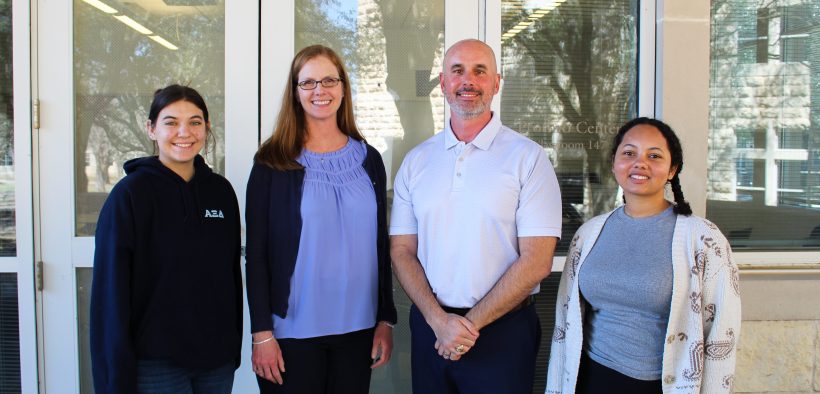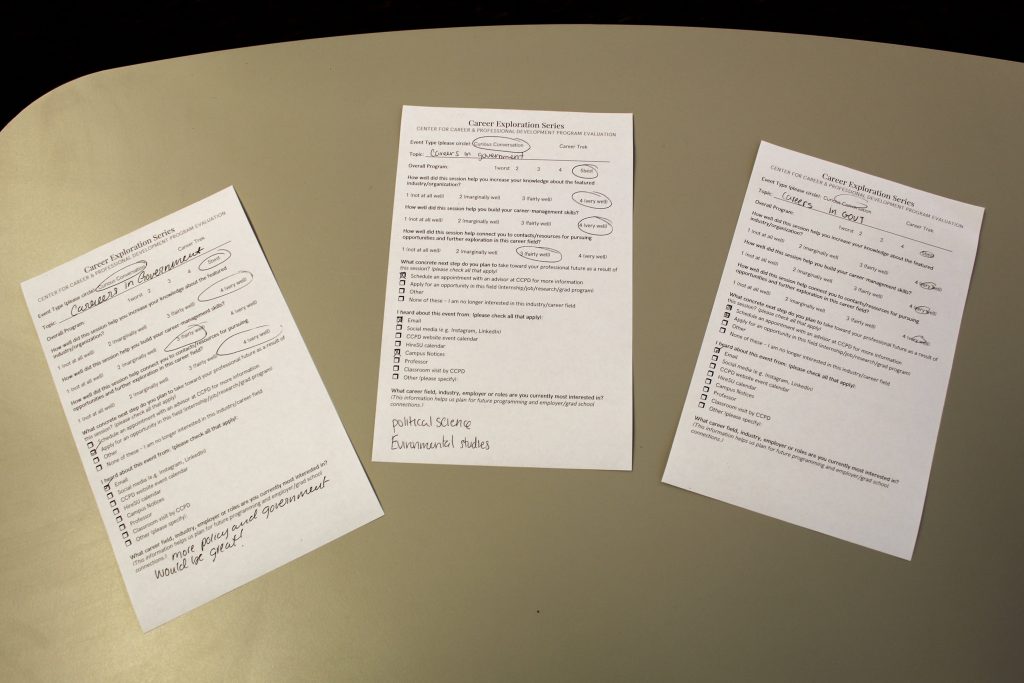Curious Conversations: Careers in Government
Share

On March 10th, 2025, from 12:30pm to 1:30pm, the Career Center for Professional Development (CCPD), co-sponsored by the Business and Political Science Departments, organized a Curious Conversation event for students to hear from business graduate Thomas Gleeson ‘02. Gleeson is the Chairman of the Public Utility Commission of Texas, and prior to serving as Chairman, Gleeson worked for the Texas Legislative Budget Board, at the Texas Senate Research Center, and with a state senator. For an hour, students in attendance were able to hear about Gleeson’s career experience, and ask their own questions about how to pursue careers in government.
Alexandra Anderson with the CCPD opened the conversation, citing how important it is for Southwestern alumni to share what they do in their careers with current students: “One of the major hurdles to liberal arts students is figuring out what is all out there, and what you might like to do.” For Anderson, connecting current students with graduates and alumni is one of the most valuable things she can do.
Gleeson studied as a business major while at Southwestern, and later earned a Master of Public Administration from the Bush School of Government and Public Service at Texas A&M University. Gleeson noted how “after 9/11, there weren’t a lot of jobs to go around, the economy had tanked, and a business major seemed nice and broad while I was in highschool.” While at Southwestern, he worked for the literary magazine, and after graduation, one of the first jobs he held was working for a state political campaign because “Tony Sanchez was willing to pay for block walking while running against Rick Perry.” He moved on to working as a bill analyst for the state senate in Austin, and he noted how his role at the literary magazine helped him get a job as a bill analyst, because he was well prepared to read, analyze, and write about legislation.
While at the Bush School of Government and Public Service at Texas A&M University, Gleeson worked for the Texas Transportation Institute before applying to a state senator’s office, which was a semester-long job. He later served as the Chair of the Senate Finance Committee and was a member of the budget committee for the state. He started work with the Public Utility Commission for the 2008 budget, and has worked there ever since. In 2020, he was named as the executive director of the commission, and was recently appointed Chairman of the Public Utility Commission of Texas by Gov. Greg Abbott on January 19, 2024. Gleeson admitted that now, “most of my time is spent giving speeches to crowds, running meetings, and going between here and Washington D.C.”
Gleeson emphasized one of the benefits to working in government. There is such a wide array of things you can get into, and federal and state agency experience is transferable, so, “once you’re in, you’re in! You’ll be in rooms you never thought you’d be in.” For example, Gleeson stated how he sat in meetings with people such as Warren Buffett and Chris Wright. Gleeson did admit that given the new administration in Washington, there is a new level of scrutiny surrounding working in the Texas state government. However, “government work is not boring in the slightest”, and he noted how he has gotten opportunities through working in the government that he never would have gotten in the private sector. For example, if you want to be an attorney and are pre-law, working for the government will have you working on your own cases in two years, compared to much longer than that at a private firm. Overall, “if you don’t know what you want to do but you like policy issues, this is a good realm for you. It’s good for leadership and doing impactful things that matter.” Gleeson highlighted how the most important thing is to be willing to say yes, even if you aren’t familiar with the job, as long as you are willing to figure it out.
At this point in the Curious Conversations event, students were able to ask their own questions pertaining to their individual aspirations or curiosities. One student asked: “I want to work in the UN– how do I do that?”
Gleeson advised that getting your first job experience in the arena you’re interested in is the hardest part: “Just get in, and a lot of jobs are easier from there.” He also reminded the room that your dream job is likely three or four steps away, so focusing on getting into the fields you’re interested in while building contacts and connections at your initial job is the first step. Another student asked what kinds of opportunities there were that focused on the environment. Gleeson mentioned that anything within the sustainability and energy realm was suitable, such as the U.S. Environmental Protection Agency (EPA). At least in Texas, which has more solar and wind energy than any other state in the country, working in energy is a field brimming with opportunity to focus on the environment. Gleeson also advised that if you’re interested in working on environmental issues and in sustainability, to not avoid oil and gas companies (though it sounds counterintuitive), because many companies also work on sustainability. Transportation and water management are also suitable fields for those interested in the environment and sustainability.

More generally, Gleeson counseled that it is incredibly helpful to simply apply for as many jobs as you can and cast a wide net. For every job in government, there’s probably at least 30 to 40 applicants, and so networking and making personal contacts is also incredibly important to build entry points that pave the way to getting hired. “Your first job out of college is not based simply on the merit of your grades.”
Gleeson reiterated how the government is a great place to figure out what you want to do: “There’s always openings, and there’s always work to be done.” He further pointed out how working on the state level compared to the federal level can be a lot more manageable: “In D.C., it’s hard to wrap my mind around how difficult it is to get things accomplished. At the state level, you are a little more insulated from the politics of it than you are in D.C.” Gleeson stressed, however, that “just because your politics don’t align with leadership of the state doesn’t mean that you can’t do good work. You have to figure out what you can deal with and what trade-offs you’re willing to make. Changes are easier to make on the inside compared to the outside.” For example, in Austin, the leadership is typically conservative, whereas the workforce is typically not.
Gleeson also emphasized how if you show how you’re always trying to learn, people will see that and appreciate that. “Don’t be shy about asking for mentorship. Find a sponsor, because people are willing to share their time with you more than you think.” A student in attendance asked if there were any specific skills required for applying to state agencies, and Gleeson took the opportunity to highlight how “a lot of early career individuals look at a job, and if they only meet seven of the ten criteria, they decide not to apply for the job. This is particularly true among women, which is ridiculous! If you see a job that’s interesting to you, just apply for it! Make them tell you no!” Gleeson did point out that cover letters are not typically required, but he highly recommends submitting one anyways: “you’re hiring the person, not the resume. Don’t sell yourself short, ever!” Gleeson reiterated that you should even apply for things that require more years of experience than you technically have: “Whether they can trust you with the responsibility is the key, not the years of experience on paper.” In response to this advice, another student asked: “How do you handle addressing a lack of skills or experience while in an interview?” Gleeson advised that you can tailor what you bring to the table now, and how that would benefit the organization that you’re applying for, and why your education and background and work history all pertain to the position: “resilience is key.”
Gleeson suggested that while still in undergraduate education, students should pursue spaces and people that challenge their ideas: “To talk about ideas in a way that is intelligent and organized and comprehensible, and not overly emotional, is super rare, and you can hone that skill in college. Independent thought and analytical ability is extremely valuable.” Gleeson also had a few recommendations for internship opportunities. At least within the Public Utility Commission, there is not a large internship program, but there are bigger government agencies that have more developed and robust internship programs that are well worth applying to.
To conclude the conversation about careers in government, Gleeson reiterated that the most important thing when seeking a job is to just say yes: “Just go and do all the things you want to do when you have less attachments, and be willing to try new things.” Building connections and building trust is ultimately what people hire you for.
